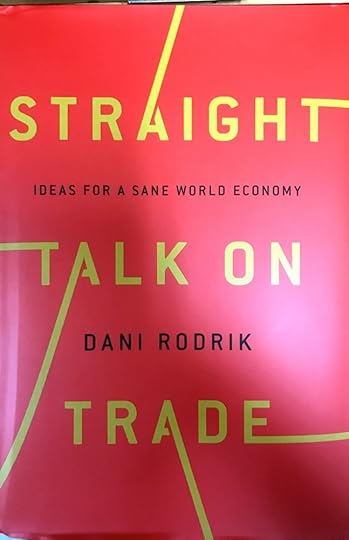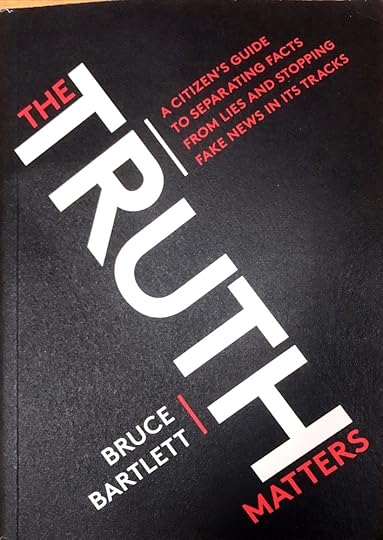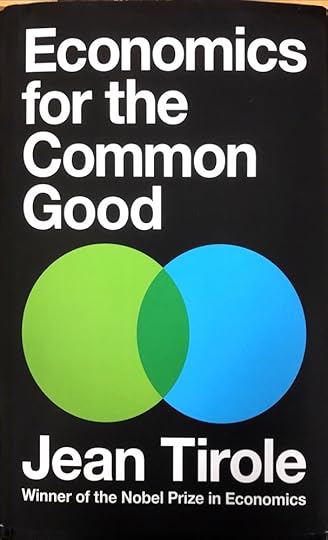J. Bradford DeLong's Blog, page 443
October 27, 2017
Should-Read: Jess Benhabib, Alberto Bisin, and Mi Luo: We...
Should-Read: Jess Benhabib, Alberto Bisin, and Mi Luo: Wealth distribution and social mobility in the US: A quantitative approach: "We concentrate on... i) skewed and persistent distribution of earnings...
...ii) differential saving and bequest rates across wealth levels, and iii) stochastic idiosyncratic returns to wealth (capital income risk), possibly differential across wealth levels. All of these factors are fundamental for matching both distribution and mobility, each with a distinct role in inducing wealth accumulation near the borrowing constraints, contributing to the thick top tail of wealth, and affecting upward and/or downward social mobility. The stochastic process for capital income risk which best fits the cross-sectional distribution of wealth and social mobility in the U.S. shares several statistical properties with those of the returns to wealth uncovered by Fagereng et al. (2017) from tax records in Norway...
Should-Read: Bridget Ansel and Heather Boushey: Modernizi...
Should-Read: Bridget Ansel and Heather Boushey: Modernizing U.S. Labor Standards for 21st-Century Families: "Women now make up almost half the U.S. workforce...
Our labor laws and institutions do little to address the various ways in which women are held back at work. This not only hampers women���s economic well-being, but also has implications for U.S. productivity, labor force participation, and economic growth.... Ansel and Boushey propose policies aimed at boosting women���s economic outcomes: paid family leave, fair scheduling, and combatting wage discrimination. They show how enacting carefully designed policies will better address the challenges of today���s labor force, enhance women���s economic outcomes, and provide benefits for the national economy...
Live from CBO: There is one very important thing to recog...
Live from CBO: There is one very important thing to recognize about the year of Repeal and Replace is that the CBO's power and influence was at a maximum even though its bureaucratic influence was zero. The bureaucratic influence of CBO comes from the fact that the midpoint of its ranges determine whether pieces of legislation do not or do fit within the parameters of the Reconciliation process and the Budget Enforcement Act, and thus are or are not subject to a 60-vote point-of-order in the Senate. But those questions have never been at issue this year. And yet the CBO has wielded enormous influence, just by saying what it thinks the effects of proposed pieces of legislation are.
That is an amazing accomplishment.
Live from the Republicans' Self-Made Gehenna: Irving Kris...
Live from the Republicans' Self-Made Gehenna: Irving Kristol: Irving Kristol in His Own Words: "Among the core social scientists around The Public Interest there were no economists...
...This explains my own rather cavalier attitude toward the budget deficit and other monetary or fiscal problems. The task, as I saw it, was to create a new majority, which evidently would mean a conservative majority, which came to mean, in turn, a Republican majority-so political effectiveness was the priority, not the accounting deficiencies of government...
A Question I Will Not Have Time to Ask Alice Rivlin This Afternoon...

Alice Rivlin is speaking this afternoon at Berkeley's GSPP in honor of John Ellwood's retirement on EVIDENCE AND POLICY ANALYSIS IN THE AGE OF FAKE NEWS. A question I will not have time to ask:
Alice, I listen to you, and I think of Irving Kristol, who explained his ���rather cavalier attitude��� to technocratic questions of what economic policies would actually do thus:
The task, as I saw it, was to create a new majority, which evidently would mean a conservative majority, which came to mean, in turn, a Republican majority-so political effectiveness was the priority, not the accounting deficiencies of government...
I think of New Mexico Senator Pete Domenici, who would always talk an excellent technocratic game in the Brookings auditorium, but he would then turn around to assure his donors that he understood the magic of economic growth from tax cuts and to assure his base that practically all government spending���save the small fraction that went for Medicare, Social Security, defense, and the Los Alamos Lab���was wasted. He was grifting somebody. And we know who he was grifting from the way he always voted: and he did not vote the Brookings line.
I look around now, and I see CEA chair Kevin Hassett���endorsed by many of your Brookings colleagues���claiming that not 25% but 300% of the incidence of the corporate tax is on labor, and that not 75% but -200% of the incidence is on capital. I see Greg Mankiw���Greg Mankiw!���putting forward a model in which (a) international capital mobility is frictionless, (b) the United States is a small open economy, and (b) lump sum taxes are available as an alternative funding source, and putting that model forward in the context of it being in some way relevant to analyzing the effects of a corporate tax cut.
It seems to me that certainly since 2001 and the return of Dick Cheney, overwhelmingly since 1993 and the rise of Newt Gingrich, and substantially since 1981, when Howard Baker worn with the Reagan tax-cut was an unwise riverboat gamble, but went along with it anyway, it has been a fool's game to seek any technocratic bipartisan common ground with Republicans. Attempting to do so has been positively harmful: it has reinforced a Grisham���s Law process by which bad Republican economists drive out good, good economists become bad in order to stay relevant and keep a seat at the table, and bad economists then become worse���because they can. And then the WaPo, the NYT, and the networks assure us that truth is somewhere between the Brookings types have have paid out substantial technocratic coin in search of bipartisan compromise and the bad Republican economists who have used this move as an opportunity to become even worse.
Larry Summers seems, in the past month, to have finally recognized this dynamic. He now seems to be thrashing around seeking a constructive way to try to counteract it.
But it seems that you still don���t see what Larry now sees. Why not? What do you see instead?
Should-Attend: Heather Boushey: Economics and feminism: "...
Should-Attend: Heather Boushey: Economics and feminism: "Finding Time: The Economics of Work-Life Conflict...
...interviwed by Lance Knobel. What can now be done as the federal political tide pulls back on advances? Will the increasing outcry about sexism in tech provide a countervailing pressure for change?...
Should-Attend: Alice��Rivlin: Evidence and Policy Analysi...
Should-Attend: Alice��Rivlin: Evidence and Policy Analysis in the Age of Fake News: "The paradox of current political turmoil is...
...even though we cannot forecast the future in our complex world ��� that our policy makers and legislators can now access much richer data-based evidence about potential costs and effects of policies more than ever possible before. Yet public data, policy analysis, and the institutions that produce them are under increasingly strident partisan attack. Dr. Rivlin will speak on how evidence-based practitioners got into this tough situation, and how we can Improve It.
October 26, 2017
Live from the Book-Lover's Utopia: Today's haul...
Live from the Caucasus: Walter Jon Williams: The Nutella ...
Live from the Caucasus: Walter Jon Williams: The Nutella War: "Conflicts within a former Soviet republic are now posing a threat to the world���s supply of Nutella...
...the disturbingly tasty Italian hazelnut-chocolate spread.
Hazelnuts are the second-largest export (after copper ore) from the Republic of Georgia, which is the third largest exporter of hazelnuts in the world. ��Georgia has also exported hazelnuts from its breakaway Russian-puppet republic, Abkhazia.
But new rules in the European Union threatens Abkhazia���s exports, because they now require an origin certificate, and the EU has no relations with Abkhazia. ��Abkhazian exporters would have to apply for a Georgian certificate, and thus admit they���re a part of Georgia after all��� which no patriotic Abkhazian could ever do (without being shot in the back of the head).
"Russia is our strategic partner, and demand for hazelnuts is low there,��� says Adgur Ardzinba, the economy minister in Abkhazia���s self-proclaimed government, which only Russia and a few other states recognise. ���We have to give priority to products that are in high demand [in Russia], such as citrus and wine.���
Well, why should the Russians expect Nutella to pay for their puppet republic? ��Let them do it themselves, and learn to make theirs own hazelnut spread!
Though it turns out that something called the ���brown marmorated stinkbug��� has no respect for national borders, and is busy devouring the hazelnut crops of both Georgia and Abkhazia.
Down with the marmorated stinkbugs! ��Let all factions unite against the threat of marmoritism! ��Let all the Caucasus unite against the insect peril, and save the world supply of Nutella!
Should-Read: Alan Auerbach: Understanding the destination...
Should-Read: Alan Auerbach: Understanding the destination-based approach to business taxation: "The rising importance of multinational companies and the changing nature of production represents a challenge to the traditional ways that countries try to tax corporate profits...
...This column examines one potential policy response ��� a destination-based cash-flow tax.... A fundamental tax reforms that can deal more adequately with the new economic realities.... builds on the concept of business cash-flow taxation.... A destination-based cash-flow tax (DBCFT)... adds ���border adjustment��� to cash-flow taxation and has the effect of basing the tax on the location of consumers rather than on the location of profits, production, or corporate residence. As described in a series of papers, including Auerbach (2017), converting an origin-based cash-flow tax into a destination-based cash-flow involves relieving tax on export revenues and imposing tax on imports, in precisely the same manner as is done under existing value-added taxes (VATs). The key difference from a VAT is that the DBCFT maintains the income tax deduction for wages and salaries, and thus amounts to a tax on domestic consumption not financed by labour income, in principal a much more progressive tax than the VAT....
There is little doubt that a large border adjustment can lead to large real exchange rate responses, through some combination of nominal exchange rate appreciation and domestic price and wage increases.�� Under simplifying assumptions, the Lerner symmetry theorem predicts that such responses should neutralise any effects on trade.�� But there are many possible complications to the analysis...
J. Bradford DeLong's Blog
- J. Bradford DeLong's profile
- 90 followers







